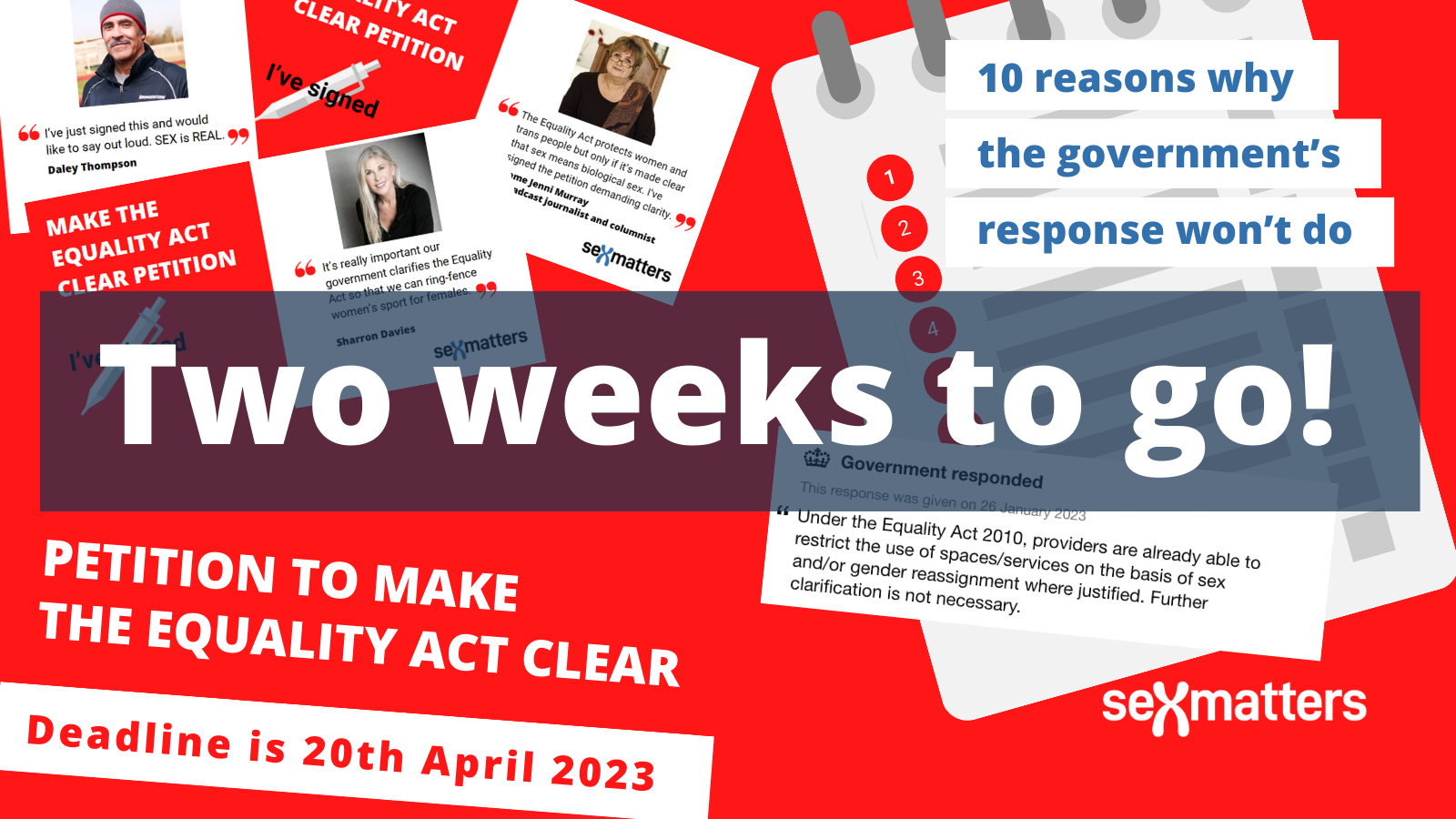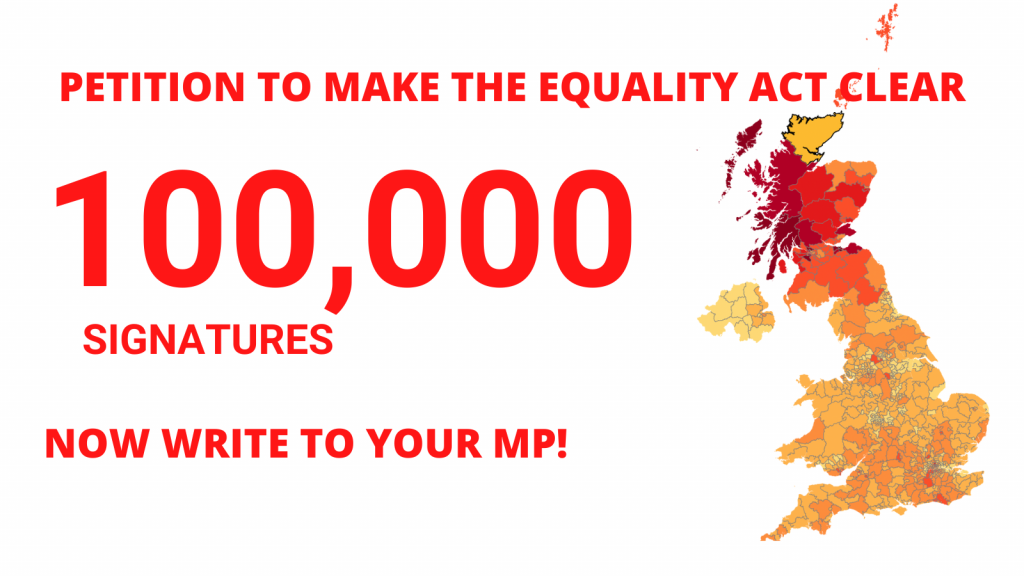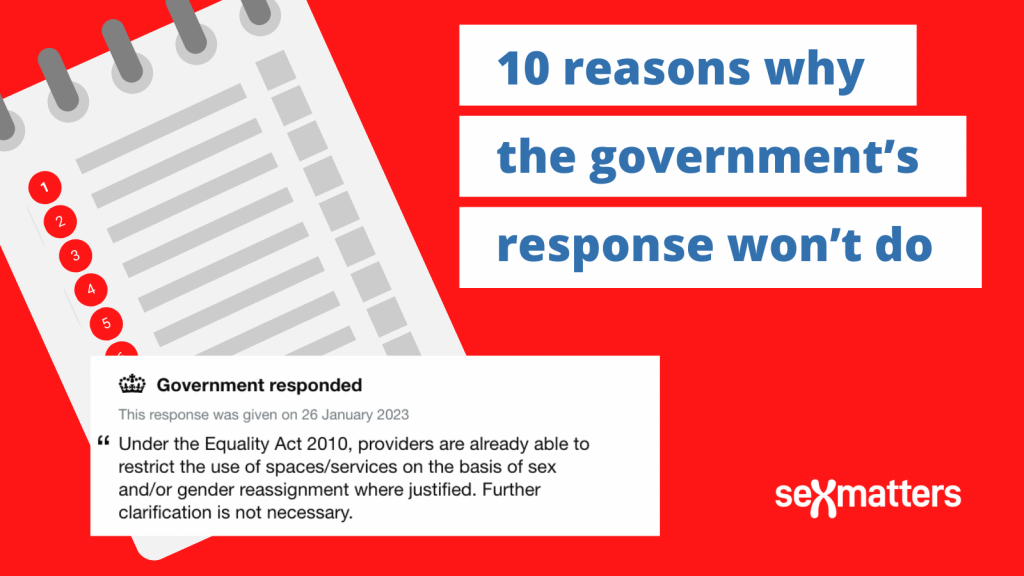Two weeks to go!

Last October, Sex Matters launched a petition asking the government to amend the Equality Act 2010 in order to make clear what the protected characteristic of sex actually means. We think it should mean biological sex – male or female; the personal characteristic that is recorded on newborns’ birth certificates, and which remains the same through a person’s entire life. But others think it means what’s written on your birth certificate at a given moment – and under the terms of the Gender Recognition Act (2004), that can change.
On 4th April, with little more than two weeks to go until the petition is closed to new signatures, the Equality and Human Rights Commission (EHRC) said that our proposal should be seriously considered by the government:
“On balance, we believe that redefining ‘sex’ in the EqA to mean biological sex would create rationalisations, simplifications, clarity and/or reductions in risk for maternity services, providers and users of other services, gay, lesbian associations, sports organisers and employers. It therefore merits further consideration.”
We would argue that “sex” has always meant sex in the Equality Act, and that any other interpretation destroys people’s human rights. But there is no doubt that confusion reigns, and that is why we think the law needs clarification.
Ever since the GRA became law, a person who gets a diagnosis of gender dysphoria, and submits evidence to a panel that they have lived as if they were the opposite sex for two years, can get a certificate allowing them to change the sex on their birth certificate. In December a Scottish court ruled that it is this characteristic – “sex as modified by a gender-recognition certificate” – that the Equality Act means when it says “sex”. That judgment may be appealed, but in any case parliament, not the courts, is the right place to untangle this mess.
Our petition got tens of thousands of signatures almost straight away. By Christmas we were halfway to having collected the 100,000 needed to be considered for a debate in Parliament, and the flood had reduced to a steady flow. But on International Women’s Day, 8th March, JK Rowling tweeted her support – and more than 11,000 people signed that day. On 9th March we hit the 100,000 mark, and we expect the debate to happen some time after Easter.

Some of those who signed were famous names, among them athletes (Sharron Davies, Daley Thompson, Mara Yamauchi, Amelia Strickler) and people in the media (Julia Hartley Brewer, Jenni Murray, Konstantin Kisin) and creative industries (James Dreyfus, Jess de Wahls, Rosie Kay). But most were ordinary men and women from across the political spectrum who care about sex-based rights, and want to see clarity in the law. Many cited personal reasons, from worrying about receiving intimate care from someone who identifies as, but isn’t actually, the same sex as them, to concerns about safeguarding children in schools and women in prisons.
We were touched by all the support, and the clear concern so many people have for protecting vulnerable people’s sex-based rights. And we’re looking forward to having a chance to get this debate into parliament, which has never yet faced up to the muddle it caused when it introduced gender-recognition certificates without ever working through all the situations where a piece of paper cannot possibly overrule other people’s perceptions of the material reality of sex.
The largest number of signatures, in proportion to the number of voters, came from two constituencies in Edinburgh. This was not surprising: the issue of gender recognition has been in the headlines in Scotland for months, and a proposal to introduce gender self-ID in Scotland caused significant public disquiet and helped contribute to Nicola Sturgeon stepping down as leader of the SNP and first minister. Sex Matters is now planning an event in Edinburgh to celebrate and thank the city: we’ll update you when we have more details.
When petitions to parliament reach 10,000 signatures, the government issues a written response. The one we received didn’t actually address our proposal, unfortunately. The Equalities Office told us that service-providers can already exclude people who have acquired their sex by means of a gender-recognition certificate, rather than by birth, from single-sex services and spaces if that is a “proportionate means of achieving a legitimate aim” (the so-called “single-sex exceptions). We wrote back and explained that service providers don’t understand how to apply this law, and worry that if they rely on it they will get sued. Moreover, the protected characteristic of sex isn’t just about single-sex provision. It’s also about employment discrimination, schools, associations and charities. The single-sex exceptions cover none of these.

As the muddle continues, we are seeing protections for sex eroded in practice. Girlguiding, for example, allows anyone who identifies as a woman to occupy roles that are supposed to be female-only. Primark takes the same approach to changing-rooms. The Ministry of Justice is struggling to decide whether a gender-recognition certificate counts when it comes to rules on searching – in other words, whether male people who have a piece of paper saying they are female may be allowed to carry out strip-searches of female prisoners, visitors and staff.
Last year, we called for evidence on why single-sex services matter, and got more than 6,000 responses in a week. Overwhelmingly, the responses showed just how much people – mostly women, but some men too – care about single-sex spaces, and how much they feel their loss. More recently, we wrote in our Lesbians without liberty report about how losing single-sex provision harms lesbians disproportionately: if the protected characteristic of sex doesn’t mean biological sex, then lesbians have lost a fundamental human right, namely freedom of association.
Our amendment isn’t the entire answer to all these problems, which have been more than a decade in the making. But it is a first and necessary step. The petition closes on 20th April and we urge you to keep sharing it and promoting it on social media. The more signatures we get, the more politicians will understand the strength of feeling on the issue. Please also write to your MP using our simple tool to tell them why sex matters in the Equality Act.
